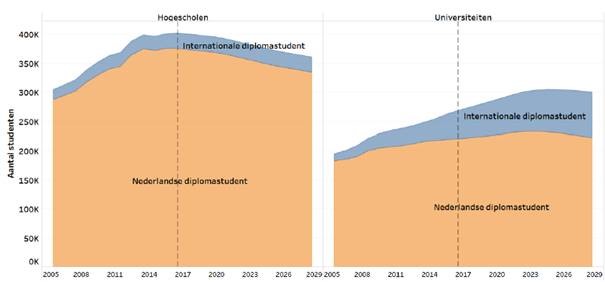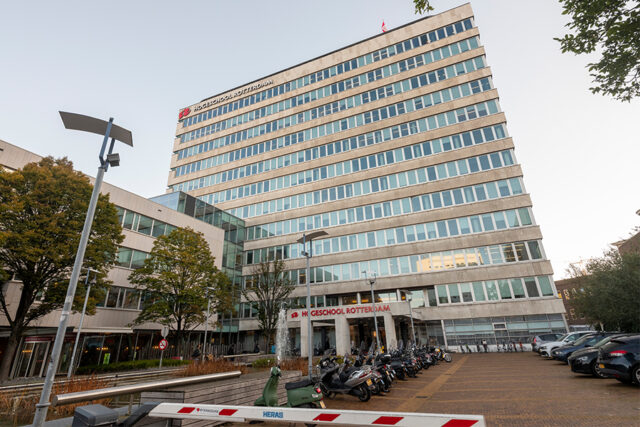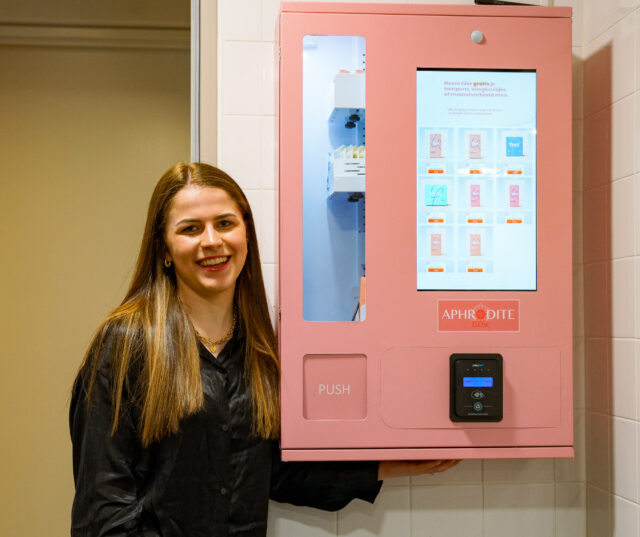‘Foreign students: bring them on!’ higher education institutions urge
Gepubliceerd: 24 May 2018 • Leestijd: 2 minuten en 7 seconden • English Dit artikel is meer dan een jaar oud.According to universities and universities of applied sciences, there is currently plenty of room for more foreign students. However, they would like to charge higher fees and implement a more selective admissions procedure.

There is increasing consensus that the switch to the English language in higher education has been a success. Universities and universities of applied sciences are pushing for education to become even more international. They will give a speech in favour of this today and have just handed in their memorandum to minister Van Engelshoven.
‘Think about the advantages of internationalisation,’ runs their argument. ‘The population is ageing and labour market shortages are growing. Why shouldn’t we recruit foreign students to fill the gaps?’
Other cultures
The quality of education would also improve with internationalisation. Students would learn to get along with other cultures, would become familiar with traditions from other countries and would be better prepared to handle the international labour market.
There may be some problems with internationalisation but they can be solved, according to the memorandum. The laws and regulations need to be modified slightly, so that higher education institutions will have more freedom to ‘steer’.
Next month minister Van Engelshoven will send a letter to the House of Representatives setting forth her views on internationalisation and English-language education. This is why the educational institution lobby is very active at the moment.
Inevitable
The institutions present as an inevitable fact that more and more foreign students will arrive, with whom you will have to get along. One out of every three university teachers is also international, as are half of all PhD students. As long as universities and universities of applied sciences have the means to safeguard quality, it will be OK.
What do you do if for instance too many foreign students enrol for a study programme, or if there is a risk that the number of Dutch students will be too small? The idea is that you must then be able to intervene. Give universities and universities of applied sciences the chance to select candidates based on nationality, so that the ‘international classroom’ will remain varied.
The institutions also want to be able to offer a study programme in Dutch as well as in English, so that Dutch students will always have access (via the Dutch track) while entry quotas could be applied to the English-language version. In doing so, higher education will continue to be accessible to Dutch students in the future even if there is a surge in the number of foreign students.
Branding
Higher tuition fees for students from outside Europe, continuing education courses for teachers, adequate student housing facilities, more Dutch students going abroad… all this is discussed. The educational institutions also want to work on improving their international branding strategy.
In the ‘final considerations’ the authors of the memorandum sum up the position the Netherlands is in: there will be less Dutch students between 2024 and 2030, while the ‘grey pressure’ will increase: in fifteen years’ time, one out of three Dutch people will have retired.
Recruiting
You could therefore mobilise all your resources to recruit foreign students. If the government pays for extra teachers, an extra forty thousand students could come here. The idea is that society will ultimately benefit from it.
HOP, Bas Belleman
Graph: Higher education internationalisation agenda, VSNU/Netherlands Association of Universities of Applied Sciences









Could you please explain what the reason is for giving a higher education fee to students from outside Europe?
… of course they would like to charge internationals higher fees.
How on earth should they otherwise be able to cover up the costs witch arise from their continuous missmanagement like the INEPAD Fiasco or the dean who stole a few hundred thousand euros from Hogeschool Rotterdam last study year.